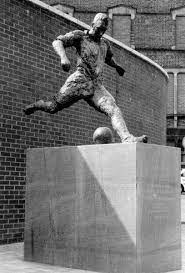Jackie Milburn
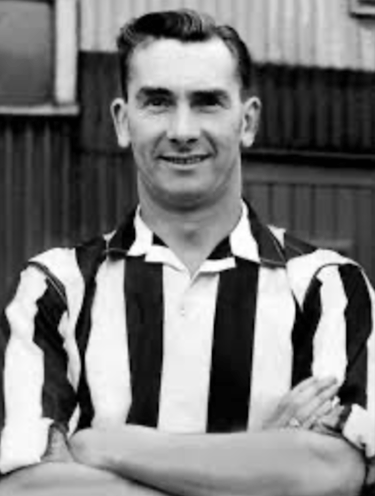

Early Years in Ashington
Jackie Milburn was born on 11 May 1924 in the upstairs flat of his grandparents' house at 14 Sixth Row, Ashington, to Annie ("Nance") Thompson and Alexander ("Alec") Milburn. His father worked as a coal cutter at the nearby colliery, disappearing each day into what young Jackie would later describe as "that deep shaft leading to the coalface" – a sight that made him shiver.
Football came into Jackie's life early. At eight years old, he received his first pair of football boots as a Christmas present, and from that moment the game dominated his world. He idolised Arsenal winger Joe Hulme and dreamed of following in his footsteps.
Though initially a confident boy, an incident at his school sports day would shape Jackie's personality for life. Having already won the sprint, sprint relay, long jump and high jump, his father arrived just in time to see him win the 440-yard race. Exhausted, Jackie collapsed to the floor. His father, mistaking the gesture for showboating, gave him "a real hiding." Reflecting years later, Jackie said: "Maybe my father's intentions were the best in the world...but that thrashing laid the foundations for an inferiority complex I've fought all my life to overcome."
At twelve, Jackie moved to Hirst East Senior Boys School and was selected for the right wing of the school football team. His father promised him a penny for every goal he scored. Jackie duly earned twopence for scoring twice on his debut in a 6–4 win against Linton School. He went on to represent East Northumberland Schools, scoring in a 3–2 semi-final defeat by Lancashire at Maine Road.
Jackie left school at fourteen. Telling his father he was too claustrophobic to follow him down the pit, he found work stacking shelves and filling sugar bags for eight shillings a week, after a brief, unsuccessful spell as a pantry boy in London. In 1939, he tried to join the Royal Navy but was rejected for being an inch too short. Instead, he joined the Ashington Air Training Corps. At sixteen, he accepted an apprenticeship as a fitter at a local colliery – a reserved occupation that would spare him from conscription during the war.
To earn extra money, Jackie and his old schoolfriend Ronnie Coulson began entering local sprint races. Jackie clocked a personal best of 9.7 seconds for the 100-yard dash. In 1940, he entered the Powderhall Sprint and won his first race. He was then instructed to run poorly in the semi-final to artificially inflate his handicap for the 1941 renewal, where his odds would be higher. Jackie duly came last, allegedly with a dozen pennies weighing down his left running shoe, causing him to "run like a lop-sided whippet with three legs."
Jackie continued playing football for the Air Training Corps. One afternoon, he was told a scout from Newcastle United was in attendance. He responded by scoring five goals in an 8–3 win. When he learned afterwards that the promised scout had never arrived, Jackie described it as "a bitter pill to swallow."
The Road to St James' Park
In 1943, Jackie and his Northumberland ATC teammates were invited to St James's Park by Newcastle United director Wilf Taylor. Jackie attended United's final home game of the season with his friend Raymond Poxton. He was distinctly unimpressed, turning to his friend and saying: "Raymond, we could play better than this, surely?"
Soon after, he responded to an advertisement for trialists published in the North Mail. The first trial was held midweek, and Jackie scored two goals in one half, earning an invitation to return on Saturday for a public trial and an 'amateur contract'. He arrived long before the 2pm kick-off with a pair of borrowed football boots wrapped in brown paper and his lunch – two pies and a bottle of pop.
Jackie's team of trialists ('The Stripes') played against a Newcastle United First XI ('The Blues'). The Stripes trailed 3–0 at half-time, and coach Joe Richardson told Jackie: "You'd better buck your ideas up son, if you want to come here." Switched to centre forward in the second half, Jackie scored six times as his side won 9–3. The Sunday Sun reported: "United's second trial proved a triumph for Milburn, the Ashington inside-left, who was signed as an amateur earlier in the week."
Newcastle manager Stan Seymour was sufficiently impressed to ask Jackie to sign on the spot. But Jackie, remembering his father's instruction not to sign anything without showing it to him first, refused. Seymour, concerned that news of Jackie's performance might alert other clubs, didn't wait. The following Sunday, he arrived unannounced on the Milburns' doorstep in Ashington.
Seymour patiently explained the terms to Jackie's father, Alec: thirty shillings a week, plus two shillings and sixpence a game "for his tea," and the same again for his bus fare. As Alec considered the offer, Seymour began rubbing two five-pound notes together behind his back. The rustling caught Alec's attention and persuaded him to allow Jackie to sign. Seymour, elated, invited everyone to the West End Club for a celebratory drink, later exclaiming: "I had secured my finest ever signing for ten quid and a couple of rounds of Newcastle Brown Ale."
Jackie's official registration as a Newcastle United player came on 23 August 1943.
Wartime Football and Finding His Feet
Jackie attended his first training session the day after signing and immediately impressed his new teammates by out-sprinting Albert Stubbins in a 100-yard dash. He joined the squad for United's next match against Bradford City at Valley Parade on 28 August 1943. Seymour invited Jackie's father to accompany them, which Jackie later said was "to give me confidence on such a momentous day."
Jackie started at inside-forward wearing the number 10 shirt. He later recalled: "This was the most memorable moment of my career, even those Wembley victories can't match it. To pull on the black and white jersey for the first time was something special." United were beaten 2–1, with a nervous Jackie heading wide of an open goal early on. The Bradford goals were both scored by half-back Joe Harvey – a man who would become a lifelong friend.
Disappointed to have made little impact, Jackie was consoled by Seymour, who assured him: "You'll be in the side next week." In the return fixture at St James' Park on 4 September 1943, Jackie scored his first goal for United with a left-footed strike inside the opening two minutes of a 3–2 win. It was his first touch of the match. He later recalled: "The Sunday papers said it was an excellent goal but...I saw the ball in a cluster of players and dashed up and belted it."
Jackie continued to combine his football career with his work at the colliery. By the turn of 1943, he had almost completed his apprenticeship and was transferred to Woodhorn Colliery. He would train two or occasionally three evenings a week, and there were instances where he worked a double shift on Friday so he would be free to play on Saturday.
As a player, Jackie continued to develop. Football historian Paul Joannou described him as "a raw talent who learned the rudiments of professional football rapidly." He played as an inside forward on either flank. In 1944–45, United finished 35th of 54 teams in the Wartime League. Due to a player shortage, Jackie even made two guest appearances for Newcastle's local rivals Sunderland, though he failed to score in either game.
For the 1945–46 season, Jackie was moved to the right wing to accommodate new signing Charlie Wayman. He publicly declared he had no qualms with the move, stating: "I must make it quite clear that for the thirty shillings I receive per match...I consider Newcastle have the right to play me in any position." Jackie's natural pace suited his new position perfectly. The Journal's sports correspondent Ken McKenzie reported after one performance that "Milburn's speed astonished the crowd."
In total, Jackie made 95 appearances for Newcastle United in War League matches, scoring 38 goals.
Competitive Football and the Switch to Centre Forward
When competitive football resumed, United played Barnsley at St James' Park in the third round of the FA Cup on 5 January 1946. Jackie was among nine players making their competitive debut. He scored twice – his first official goals for the club – in a 4–2 win before 60,284 spectators. However, United lost the return leg 3–0 and were eliminated 4–5 on aggregate.
Competitive league football recommenced for the 1946–47 season, though Jackie remained a fitter at Hazelrigg Colliery. United began at Millwall on 31 August 1946, winning 4–1. With Jackie deployed on the right wing supplying crosses for Len Shackleton and Wayman, United lost only three league games from the start of the season to Christmas Eve and led the table. However, three consecutive defeats over Christmas checked their momentum, and during the extremely harsh winter of 1947, Newcastle's form dipped and they fell out of promotion contention.
In the FA Cup semi-final against Charlton Athletic at Elland Road on 29 March, United were beaten 4–0 amid reports of significant pre-match dressing-room acrimony. United eventually finished fifth in the league. Jackie, who had played on the right flank for almost the entire season, made 27 appearances in all competitions and scored 8 goals.
The 1947–48 season began with a new manager, George Martin, taking charge after Seymour stepped down. Leading scorer Wayman was sold to Southampton in October, leading to a discussion about his replacement. Martin declared: "Jackie's the man." Trainer Norman Smith protested: "No, keep him at inside-left or on the wing." Joe Harvey agreed: "Aye, he's not good enough in the air for centre-forward." Jackie himself violently shook his head: "They're right. I'm not cut out to lead the attack. I'm happy where I am." But Martin insisted: "You're wrong, all of you. Jackie will make a centre-forward and will get a cap into the bargain!"
Jackie, who later described Martin as "one of the most astute managers I've ever met," reluctantly accepted the decision. He later admitted the switch "changed my life." Despite suffering a sleepless night through nerves, in the very next match against Bury on 18 October 1947, Jackie wore the number nine shirt for the first time and scored a hat-trick in a 5–3 win.
By January 1948, Jackie's goals had helped Newcastle to second place in the league. On 3 January, Luton Town arrived to face 64,931 fans and what author Roger Hutchinson called "a Jackie Milburn blitzkrieg." Jackie scored a hat-trick, prompting the Sunday Sun to write: "Milburn's refreshing pace and enterprise dominated proceedings... his speed and abandon encourage high hopes that he will spearhead United to promotion."
United were promoted in second place with a game to spare. Jackie finished the season as top scorer with 20 goals in 40 matches.
Establishing Himself in the First Division
Prior to the start of the 1948–49 season, Jackie was diagnosed with external otitis, which prevented him from working underground at Hazelrigg, though he continued surface work. On the pitch, according to Joannou, "Milburn went off like a bomb." He scored in the first home game of the season in a 2–2 draw with Chelsea on 25 August 1948, then scored five in his next six league matches.
Jackie's form was such that he won his first England cap on 9 October. Two weeks later, he put in a transfer request to the Newcastle board, stating: "I need to get away from Tyneside as my wife's health is suffering." The request "sent Tyneside into a panic" but was soon withdrawn after an intervention by Stan Seymour. Jackie later explained he had been swayed by his international colleagues to believe that "big money could be made...outside of soccer if I moved to another club... on reflection, I realised what a foolish young chap I'd been."
On Christmas Eve 1948, Newcastle led the Division One table by a point. However, their title hopes were effectively ended when eventual champions Portsmouth left St James' Park with a 5–0 win on 6 April. Newcastle eventually finished in fourth place, and Jackie top-scored again with 19 goals in all competitions.
In the summer of 1949, Newcastle United embarked upon a tour of the United States. The Winnipeg Free Press reported: "Jackie Milburn, a pit electrician and the club's present centre-forward, is considered the fastest player in English soccer and is of international class." Jackie lived up to his reputation – in ten matches, United won all ten and Jackie scored 31 goals.
The 1949–50 season started poorly with three straight defeats, but as Jackie and George Robledo began to develop as a partnership, form and results improved. United finished the season in fifth place. Jackie was top scorer once more with 19 goals and, according to Joannou, "he now had become accustomed to the centre-forward's trade, looked the part...and had become the country's new rising star."
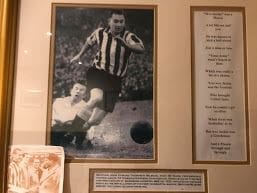

Newcastle United FC 1949-50
The pulling on of the number nine shirt and Jackie’s amazing achievements are known by many, but what many do not know is Milburn was a Freemason here in the Province of Northumberland.
He was the very first initiate into Shiremoor Lodge No.6921 in 1950 at the age of 25, on the same night as the Installation of the first Worshipful Master of the Lodge. He never progressed in the lodge and stayed as Chief Steward to serve the brethren. He said that he enjoyed serving the brethren their food as they had supported him in his footballing career and this was a small way of returning their support.
In Shiremoor Masonic Hall, a well known poem amongst Northumberland Freemasons is on display in the bar:
Wor Jackie” was a Mason. A bit like you and me. He was known to kick a ball about just a time or two. “Toon Army” wasn’t heard of then, which was really a bit of a shame, Cos wor Jackie was the General who brought United fame. Now he couldn’t get so often, when there was footballin’ to do, but wor Jackie was a gentleman and a mason through and through.
The Glory Years: Three FA Cup Triumphs
1951: "Spoiling Matthews' Party"
Jackie put aside the disappointment of the 1950 World Cup by scoring twice to help beat Stoke City in Newcastle's opening game of the 1950–51 season. His goalscoring form, which included a hat-trick in a 6–0 win against Huddersfield Town, helped United to a ten-game unbeaten start and took them to the top of the table.
When United turned their attentions to the FA Cup in January 1951, Jackie was in devastating form. He scored in the third round against Bury, then netted twice in a thrilling 3–2 fourth-round victory over Bolton Wanderers. He scored again in the fifth round against Stoke City and in the sixth-round replay against Bristol Rovers. In the semi-final replay against Wolverhampton Wanderers at Huddersfield, Jackie scored again as United won 2–1. He had scored in every round played.
By the time of the 1951 FA Cup Final on 28 April, Newcastle had been replaced as favourites by their opponents Blackpool, who had finished the season one place higher than United in Division One. Blackpool were also the popular choice among the public and press, many of whom had christened the fixture "The Matthews Final," hoping to see 36-year-old Stanley Matthews win the FA Cup for the first time.
Jackie, annoyed by Blackpool's favoured status, later described his determination "to spoil Matthews' Wembley party."
In the first half, Jackie had a goal ruled out by referee William Ling for handball. Jackie later argued: "He was wrong – I never touched it!" – a claim vindicated by slow-motion replays. The goalless first half was disappointing as Blackpool frustrated United with a well-drilled offside trap.
However, five minutes into the second half, George Robledo played a through-ball to Jackie, who broke the offside trap, raced clear and sidefooted home to put United 1–0 up. Five minutes later, Jackie scored again. After a passing move on the right wing, the ball was played to Ernie Taylor, who immediately back-heeled it to Jackie 25 yards from goal. Jackie hit a first-time, left-footed shot into the top corner with such force that he fell over in striking it.
Jackie's second goal was of such quality that Blackpool forward Stan Mortensen held up the restart for several seconds to congratulate him, saying: "That's just about the greatest goal I've ever seen. It deserves to win the cup."
United held on comfortably to win 2–0. Stanley Matthews was in no doubt as to why United had won, telling the press afterwards: "It was definitely Milburn's match! His terrific speed made the first. The second was right out of the world! It was the greatest goal I have ever seen and certainly the finest scored at Wembley. A goal every player dreams about."
Jackie's brace took his season's FA Cup total to 8 goals in 8 games. He also top-scored in the league with 17 goals.
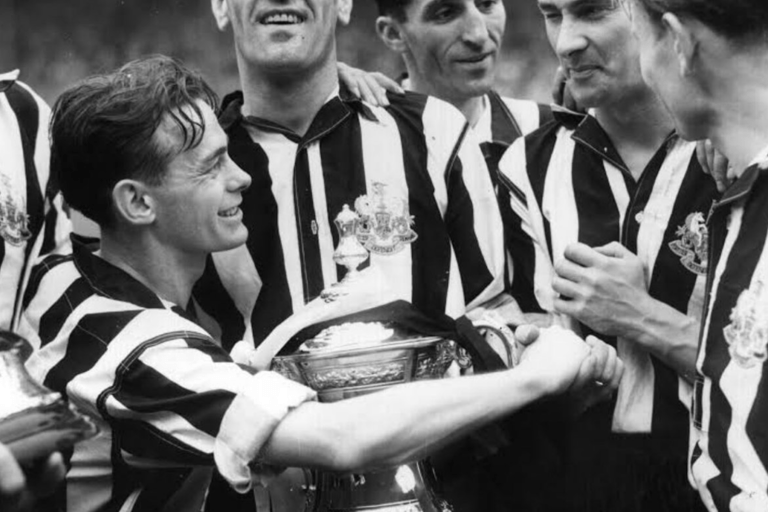

NUFC beat Blackpool 2-0 to win the FA Cup
1952: Back-to-Back Glory
After a fractious pre-season, United began the 1951–52 season in very good form, despite Jackie missing several matches due to a pulled leg muscle. When fit again, Jackie asked to be selected for the reserves so as not to disturb a winning side, later explaining: "I thought it unfair that the forward line should be changed to accommodate me and Mr. Seymour accepted my request."
By 12 January 1952, Jackie had scored 16 league goals. United's hopes of retaining the FA Cup almost ended in round three when Aston Villa led 3–1 at St James' Park. Three goals in the last nine minutes gave Newcastle a 4–2 win.
Prior to scoring his 100th competitive Newcastle goal in a defeat at Burnley on 20 January, Jackie had been linked with a move to league champions Tottenham Hotspur. He afterwards pledged his future to United, telling reporters: "I object to these stories that have persistently linked me with other clubs. I have never been happier than I am now with Newcastle United. If I leave Newcastle it will happen because they have kicked me out."
United travelled to White Hart Lane in the fourth round of the FA Cup and beat the champions 3–0, before winning a fifth-round tie at Swansea Town 1–0. Jackie had failed to score in the competition prior to a quarter-final meeting with Portsmouth at Fratton Park on 8 March. In a match described by The People as "the cup-tie of the decade," Jackie scored what author Dylan Younger later called "a stunning hat-trick" in helping United to a 4–2 win. The Sunday Express exclaimed: "Without exaggerating I should say that Milburn turned in one of the best centre-forward displays of all time."
After a 0–0 draw against Blackburn Rovers in the semi-final at Hillsborough, Jackie provided an assist early in the second half of the replay to help Newcastle to a 2–1 victory and a second successive cup final.
However, progress in the FA Cup triggered another collapse in league form. Sunday Times reporter Arthur Appleton recalled: "The BBC asked me to record the sound of a Newcastle goal being acclaimed by the crowd. I followed them from match to match and they never scored a goal; they were keeping themselves for Wembley." United eventually finished in eighth place, 12 points behind champions Manchester United.
On 3 May 1952, Newcastle and Jackie travelled to Wembley to play Arsenal in the FA Cup Final. In the 24th minute, Arsenal right-back Wally Barnes suffered a serious injury after his studs were caught in the Wembley turf. As substitutes were not permitted, Arsenal had to play with ten men for the rest of the match. Jackie had a quiet match, though he almost scored with a header that was cleared off the goal line. A goal from Robledo five minutes from time meant Newcastle became the first team in the 20th century to retain the cup.
Jackie scored 25 league goals during the season and was the second-highest scorer at the club behind George Robledo.
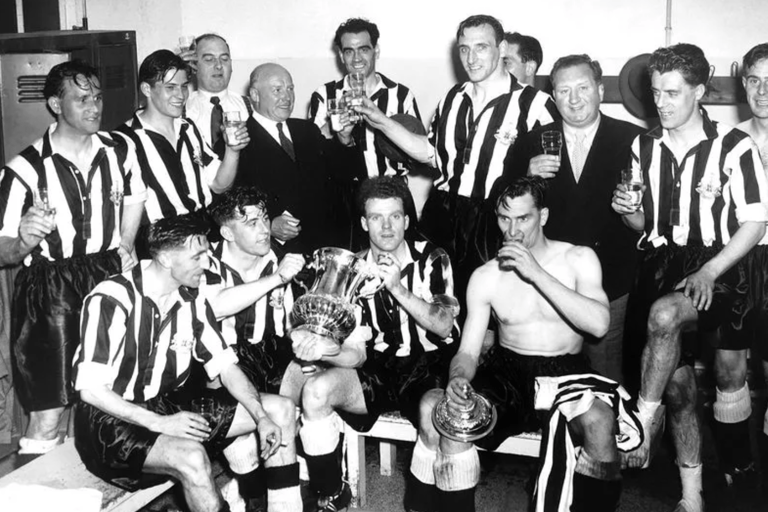

FA Cup Winners 1952
1955: The Fastest Goal in Wembley History
Jackie joined his teammates on a tour of South Africa in the summer of 1952 but suffered a series of niggling injuries. Injuries continued to limit his appearances throughout the 1952–53 season – he didn't score a goal until he converted a penalty in a 2–0 win over Manchester City on 27 September 1952.
The next few seasons saw Jackie battle injuries and age, but he remained a vital part of the Newcastle side. In the 1954–55 season, Newcastle once again reached the FA Cup Final, this time facing Manchester City at Wembley.
Just 45 seconds into the match, Jackie scored what would become the fastest goal in an FA Cup Final at Wembley – a record that would stand for 42 years until Roberto Di Matteo beat it in 1997. Newcastle went on to win 3–1, giving Jackie his third FA Cup winner's medal and cementing his legendary status on Tyneside.
In total, Jackie played in three FA Cup-winning finals for United – 1951, 1952 and 1955. His two goals in the 1951 final and his record-breaking opener in 1955 brought him national recognition and afforded him iconic status that would last a lifetime.
Later Playing Career
By the time Jackie left Newcastle in 1957, he had become the highest goalscorer in Newcastle United's history with 200 competitive goals. He would remain so until he was surpassed by Alan Shearer in February 2006.
Jackie's transfer to Linfield in June 1957 was almost jeopardised when the Newcastle board demanded a substantial signing fee, and much to the anger of fans, Jackie was not immediately granted a testimonial. His signing for the Belfast club "added thousands to the gate," and he made 54 appearances, scoring 68 goals in four seasons in all competitions. He won nine trophies, including an Irish League title and Irish Cup, and finished as the league's top goalscorer in both the 1957–58 and 1958–59 seasons, becoming the first non-Irishman to achieve this feat.
When he left Linfield, Jackie dropped down to non-league level and played for Southern Football League Division One club Yiewsley for two seasons. After retiring as a player, he briefly managed Ipswich Town before returning to Tyneside to become a sports journalist for the News of the World. According to author Dylan Younger, he also acted as "an unofficial advisor to Newcastle managers," including forming a close relationship with former teammate Joe Harvey. He would work for the News of the World for the next 23 years.
In 1967, Jackie was finally given a belated testimonial match by Newcastle. He had worried that ten years after leaving the club, people would have forgotten him, but he needn't have worried – almost 50,000 turned out at St James's Park. The match featured a host of stars including his cousins, the famous World Cup-winning brothers Jack and Bobby Charlton, and the great Hungarian player Ferenc Puskás.
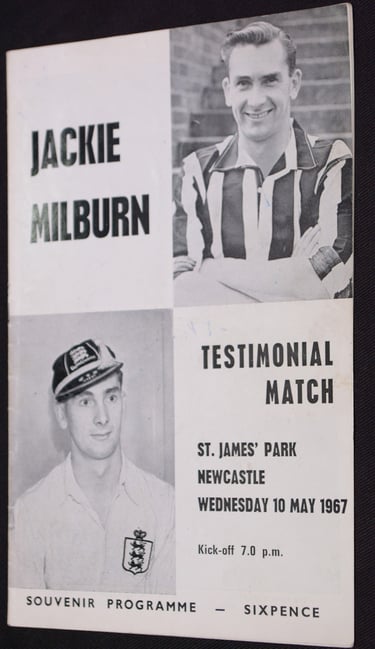

Personal Life
In 1947, Jackie was staying at a Letchworth hotel with his Newcastle teammates when he met Laura Blackwood, a silver-service waitress working at the hotel. According to Laura, she was serving him breakfast when he asked her out, and they went to the cinema. Three months later, she travelled to the family home in Ashington, and Jackie proposed. They married on 16 February 1948 at Willesden Register Office in North London. They had three children – Linda, Betty and Jackie Jr – and six grandchildren.
Despite his achievements, Jackie was reportedly a very shy and self-deprecating individual, whose modesty further endeared him to Newcastle United supporters. According to Tom Finney, this stemmed from an "innate inferiority complex" – the legacy of that childhood thrashing from his father after the school sports day.
Jackie was cousin to the mother of Jack and Bobby Charlton. His uncle, Alexander Milburn, was the father of four professional footballing brothers – Jack, George, Jimmy and Stan Milburn – who were brothers of Jack and Bobby Charlton's mother, Elizabeth "Cissie" Milburn.
Honours and Recognition
In 1980, Jackie became the first footballer to be made a Freeman of the City of Newcastle upon Tyne, an honour later also bestowed on former opponent Bobby Robson and the man who surpassed his Newcastle United goalscoring records, Alan Shearer. He was the subject of This Is Your Life in 1981, when he was surprised by Eamonn Andrews at the studios of Tyne Tees Television in Newcastle.
In 1987, Newcastle United opened their new West Stand at St James's Park. It was named the Milburn Stand in Jackie's honour – the only stand at St James' Park named after a player. That same year, Jackie was voted the "greatest post-war North East footballer" by the local press.
Three statues of Jackie were commissioned. One was placed in Station Road in his birthplace Ashington, funded by donations raised by Civic Head Councillor Michael George Ferrigon during his term of office. It now stands at Ashington Leisure Centre in Lintonville Terrace. A second statue was unveiled by Laura Milburn on Newcastle's Northumberland Street in 1991. It was designed by sculptor Susanna Robinson and cost £35,000, raised after an appeal by the local newspaper attracted donations from local businesses and Newcastle United supporters. The statue stands 12 feet high, and the inscription reads: "John Edward Thompson Milburn, footballer and gentleman." It was relocated in 1999 to St James' Boulevard, then moved again to its present position on Strawberry Place, just outside St James' Park.
In 1991, a steam locomotive that had previously hauled coal at Ashington Colliery, where Jackie had worked, was renamed Jackie Milburn in his honour. After a fundraising initiative launched in 2006 by Jack Milburn Jr to restore the locomotive, it was displayed in Jackie's hometown again in 2011.
In 2006, Jackie was inducted into the English Football Hall of Fame in recognition of his contribution to English football. In 2008, Excelsior Academy School in Newcastle's West End was assigned the official name "Milburn School of Sport and Health-related Studies." In 2009, Goal.com listed Jackie 43rd in their list of the "top English players of all time." A feature in the Belfast Telegraph to celebrate the 125th anniversary of Linfield listed Jackie as the second-greatest player to have ever represented the club. In 2012, a survey by the Evening Chronicle placed Jackie first, ahead of Bobby Robson and Catherine Cookson, in their list of "100 Greatest Geordies."
Sport Newcastle's "Young Talent" award is entitled the Wor Jackie Award in his honour.
Jackie was also the subject of a 53-minute documentary, "A Tribute to Jackie Milburn: Tyneside's Favourite Son," produced by Tyne Tees Television and later released in 1989 by Video Gems on VHS. It covered his life, times and career with Newcastle United.
Final Days
Jackie Milburn died of lung cancer on 9 October 1988, aged 64, just two days before what would have been his 64th birthday. His funeral took place on 13 October at St Nicholas's Cathedral in Newcastle and was attended by over 1,000 mourners. Tens of thousands of people lined the streets to watch the cortège pass – a testament to the love and respect the people of Tyneside held for their hero.
His ashes were later scattered on the pitch at St James' Park, the ground where he had created so many magical memories and where his name would live on forever through the Milburn Stand.
Legacy: Wor Jackie
Jackie Milburn remains a legendary and beloved figure in Newcastle and beyond. He is remembered not only for his goal-scoring prowess – his blistering pace, his thunderous left foot, his ability to score goals that took the breath away – but also for his modesty, his gentlemanly qualities and his status as a man of the people.
He never forgot where he came from. The boy from Ashington who shivered watching his father disappear down the pit shaft, who ran like the wind in borrowed boots, who scored six goals in a trial match and changed his life forever. The man who wore the black and white with such pride that pulling on the jersey for the first time remained the most memorable moment of his career, even above those three Wembley triumphs.
He was known affectionately as "Wor Jackie" – a Geordie term of endearment meaning "Our Jackie." And that's exactly what he was. Not a distant superstar, but one of their own. A coal miner's son who became a footballing legend but never lost his humility, never lost his shyness, never stopped being the modest, self-deprecating man who had fought all his life to overcome that inferiority complex instilled in him as a boy.
His statue stands outside St James' Park, forever frozen in time, forever young. The inscription reads: "John Edward Thompson Milburn, footballer and gentleman." Those four words capture the essence of the man. A footballer of sublime talent who thrilled generations with his speed and skill. And a gentleman whose decency, modesty and warmth made him beloved far beyond the football pitch.
From the coal mines of Ashington to the hallowed turf of Wembley, from borrowed boots wrapped in brown paper to a statue outside St James' Park, Jackie Milburn's life was a remarkable journey. He remains Newcastle United's second-highest goalscorer, a three-time FA Cup winner, and above all, a symbol of everything that is good about football and the people who love it.
Wor Jackie. Forever remembered. Forever loved. Forever a legend.
Jackie Milburn Testimonial Match Programme 1967.


